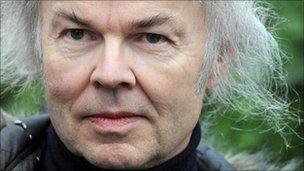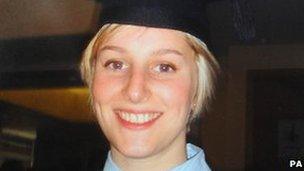Vincent Tabak trial: Christopher Jefferies caught in 'feeding frenzy'
- Published

Mr Jefferies was eventually released without charge
When Christopher Jefferies was arrested on suspicion of murdering Joanna Yeates, every aspect of his life became the focus of the nation's media.
The avalanche of headlines and claims about Miss Yeates's landlord were later said to have been the result of a "feeding frenzy" among elements of the UK's media.
The disappearance of the 25-year-old Bristol landscape architect on 17 December 2010 had attracted the focus of the media from early on.
Six days after she was last seen, amid fears she had been abducted, Avon and Somerset Police held a press conference with her parents David and Teresa to appeal for information.
Two days later, on Christmas Day, her snow-covered body was found on Longwood Lane, Failand, near Bristol.
When Mr Jefferies was arrested on suspicion of her murder on 30 December, the appetite for information seemed insatiable.
Admission to jurors
Vincent Tabak - the man who would later emerge as Miss Yeates's killer - also saw it as an opportunity.
The 33-year-old Dutch engineer gave police false information he hoped would pile more suspicion on Mr Jefferies.
He later admitted trying to wrongly incriminate the retired English teacher, who lived in the flat above Miss Yeates and her boyfriend Greg Reardon in Canynge Road in Clifton.
Tabak, who was Miss Yeates's next-door neighbour as well as Mr Jefferies' tenant, was arrested in January and later pleaded guilty to Miss Yeates's manslaughter but denied murder.
At his trial at Bristol Crown Court, he admitted telling police Mr Jefferies' car had moved on the night of 17 December.
"I shouldn't have said that about Chris Jefferies," he told jurors.

Miss Yeates disappeared on 17 December 2010
The court heard that Tabak and his girlfriend Tanja Morson had visited his family in the Netherlands during the festive period.
They saw news coverage that Mr Jefferies had been arrested and Miss Morson called Avon and Somerset Police to say Tabak had some information that may be useful.
Det Con Karen Thomas visited the pair at a hotel in the Netherlands, the court heard.
Tabak said on the night that Miss Yeates died, Mr Jefferies' Volvo had been facing one way in the driveway and the next day it was facing the opposite way.
"The indication being that Mr Jefferies had moved his vehicle during the night," Det Con Thomas said.
'Substantial' damages
Mr Jefferies was eventually released from police bail without charge.
In the media he had been portrayed as an "eccentric loner" - and worse.
After his release, Mr Jefferies accepted an apology and "substantial" libel damages from the Sun, Mirror, Sunday Mirror, Daily Mail, Daily Record, Daily Express, Daily Star and the Scotsman.

Tabak admitted wrongly incriminating Mr Jefferies
Mr Jefferies' lawyer told the High Court hearing his client had taught English at the Bristol public school Clifton College for 34 years, and was of good character.
In July, the Daily Mirror and the Sun were fined for being in contempt of court by the High Court over their reporting of the investigation.
The Daily Mirror was fined £50,000 and the Sun £18,000.
The Lord Chief Justice, Lord Judge, told the hearing that two articles in the Mirror had "vilified" Mr Jefferies.
He said they had wrongly asserted he had been involved in unacceptable sexual behaviour and was linked both to paedophile offences and a 1974 murder.
'Witch-hunt' victim
The Mirror said it was seeking leave to appeal.
The court heard the Sun had conveyed the impression Mr Jefferies was "a stalker, with an obsession with death".
Louis Charalambous, Mr Jefferies' lawyer, said: "Christopher Jefferies is the latest victim of the regular witch-hunts and character assassinations conducted by the worst elements of the British tabloid media."
Mr Jefferies' legal team said he was also pursuing a civil case against the police for wrongful arrest and false imprisonment.
Attorney General Dominic Grieve welcomed the contempt judgement, saying: "These two newspapers completely lost the plot, they engaged in a feeding frenzy over the new year period."
He said it acted as "a reminder to the press that the Contempt of Court Act applies from the time of arrest".
The act aims to prevent potential jurors from becoming influenced by press and broadcast reports.
- Published30 July 2011
- Published29 July 2011
- Published29 July 2011
- Published7 March 2011